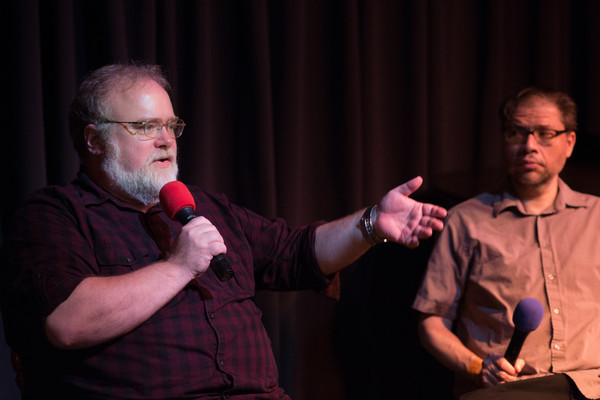“A car can be sexy in the same way a person can be sexy — although the trait is a bit harder to define when you’re talking about sheet metal versus flesh. Part of a sexy car’s appeal is purely physical: proportions and curves, size and muscle. Humans have eyes, lips and hips; cars have headlights, grilles and fenders. But then there’s the truly intangible — the animal attraction that turns mere mortals into drooling buffoons. For this, a machine must be bold, distinctive and aggressively elegant. And there’s the sound, too — a car’s voice. A beautiful car you admire. A sexy one you desire.” – Marc Lachapelle
At SVII this month, we parted the curtains of Angelica’s Bell Theatre with an opening act by German “comedian”, Sven Beiker, also known as the Executive Director of CARS (Center for Automotive Research at Stanford):
Sven had started his illustrious career at BMW, stationed at a variety of locations including the BMW lab here in the Silicon Valley. The CARS institute currently deals with a lot of the electronics research, mechanical engineering, and even legal aspects of cars. Among the interesting tidbits that Sven shared are innovations in the area of secondary use for car parts (such as the battery), especially relevant in light of the relatively short 13-year lifespan cars have to their manufacturers; These folks seem to also be carving a space in the legal and governmental playgrounds as well. After an energetic Q&A, we lifted our glasses to Sven, as he waved goodbye to celebrate German reunification day.
Our intermission was provided by Jessie Chen and Roland Van der Veen – a swing dance showcase with a little bit of cheek and sass to the program’s namesake musical hit “Greased Lightning”:
Missed it? You can check out the original video here:
Next up was Peter Oliver of Switch Vehicles, located in Sebastapol (just across the Golden Gate Bridge):
From a background in software and hardware, Peter had decided to combine his passion for cars and his propensity to have fun into a new project involving electric power conversion. His aspiration? To make an automobile with a 100 mile range, that can carry 3 to 4 people, and cost only $15,000. And thus, “The Switch” was born.
The Switch is a three-wheel vehicle with 33% of the weight on each tire. (The decision to use 3 wheels was inspired by the desire to be classified by the FMVSS (Federal Motor Vehicle Safety Standards) as a motorcycle.) Putting his business sense to work, Peter also realized that the hardware industry could give him an edge by allowing him to buy standard parts, and farm out more specialized components to contract manufacturers. The audience was dazzled by the Switch’s many possible configurations… and even superhero qualities, such as one version’s ability to carry 600 lbs of hay. In addition, the building of the Switch also leaves its mark as the crux of various training programs for high schools and prisons.
Finally, Brad Templeton, Google’s car consultant and board member of the Electronic Frontier Foundation painted a vision of Robocars:
At first, he cited the many reasons why cars really should be automated and electronic. For example, humans are bad drivers and 34,000 people are killed in America and 1.2 million worldwide every year as a result, many useless hours are spent driving in traffic, 25% of CO2 emissions today are from cars, and 8 cents per mile is continuously being spent on accidents and even more on gas. He also demonstrated that 60% of the land area in LA is dedicated to cars from driveways to parking lots to highways. Brad suggested that if we had small electric robocars they could be called up whenever they are needed, they can also self park 3X tighter and in areas that are mostly out of sight. For this seemingly futuristic system to be implemented, the AI systems needed are not the omniscient ones of science fiction lure, but actually rather simple collision avoidance systems that are fairly attainable. Brad also showed a convincing video of a Google robocar picking up and driving a blind man to and from the store without any human intervention. The video was created by Google-hired Stanford students who had won the DARPA challenge for off road and urban driving, the day after Gov. Jerry Brown signed into law the legal ability to have robocars on the road.
We ended the evening with a lively panel discussion moderated by Max Sims (our auto-savvy presenter from the Images Speak event):
…and discussed issues ranging from the business models around car and battery ownership, to the Minority Report scenario of being betrayed by your robocar. (And can a Jewish man have a robocar drive him to the temple on the Sabbath?)
All in all, our impressive cast of speakers presented compelling perspectives on how the Silicon Valley is innovating in the area of transportation, and in the spirit of SVII, each broke out of conventional thinking in his own unique ways.
Be sure to join us on our next adventure: Design for Experience! (Innovations in User Experience and Product Design)
Pre-registration Tickets ($20) on SALE now!





